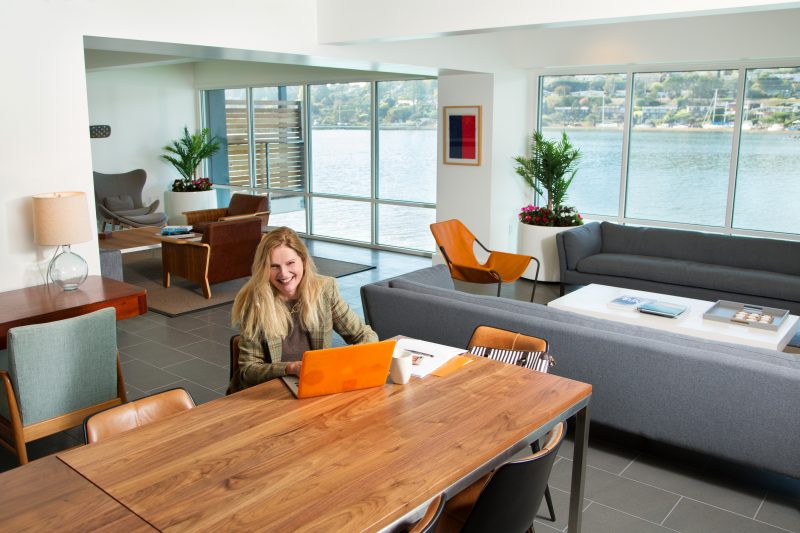The Small Business Administration estimates that a third of all businesses fail in the first year; half by year five. One of the main reasons for these failures is a lack of capital, causing short- and long-term cash flow problems.
It can be tempting for a new business owner to want to open a flashy new office to court clients and add legitimacy to the endeavor — it certainly was for me when I started KardZee.com. But I also knew that meant additional financial risk. I mean, it’s hard enough to start a business without adding unnecessarily to the inevitable startup costs, especially when receivables often lag behind the payables in the early stages.
KardZee was just an idea in 2015. It started out as a consumer app for handwritten cards that you could create on your smartphone and send it to friends and family. The idea morphed over time, turning into a full-fledged marketing company that now targets upscale businesses that want to build personalized relationships with their clients for increased sales and retention. Using our technology, businesses can integrate this into their automated omnichannel engagement platform to build their company.
A fluid business model is not unusual for a startup, particularly in the technology sector. But costs can really add up as you change your vision, so you have to look at how and what you spend your money on in different ways, in order to reduce expenses.
 My husband and I looked at lots of options. The one that kept coming back to us was that we could rent a home instead of owning one. We could also forego the office space and go with a home office concept instead.
My husband and I looked at lots of options. The one that kept coming back to us was that we could rent a home instead of owning one. We could also forego the office space and go with a home office concept instead.
A few years ago, this would have been a bit of a challenge. Property managers frowned on renters who wanted to run a business out of their home.
For our startup, it was a tall order. After all, we needed to make a statement about our new business. Where we called home was also our base of operations. So it had to be business-friendly, and offer the amenities we needed like broadband and meeting/entertainment spaces.
The Cove at Tiburon in Marin County fit our needs to a tee. It was also conveniently located right across the San Francisco Bay. We knew from the start that it was a smart decision, both from a business and personal standpoint. The property offered us a nice blend of residential and business amenities, such as a clubhouse where we could film videos and podcasts for our KardZee YouTube Channel and LinkedIn page. The media room provided space for meetings where we could dock our computer and use the large screen monitor. As we continued to build our business, we found that our new home allowed us to reduce our reliance on coworking office spaces in San Francisco. Purchasing property, rather than renting this living space, simply wouldn’t have afforded us these options!
All these capabilities were on our wish list, but it took some legwork to find a good match. One of the big selling points for us was the marina. The Cove had a private marina, and we had a classic wooden 1965 sailboat that we used for both business and pleasure. We were able to move the boat outside our living room, and we’ve used it often to close a business deal with clients, investors, and partners.
Living and working in the same place has had its share of surprises — one of them being the realization that other entrepreneurs also lived at the property. I ended up connecting with several women entrepreneurs and before we knew it, we had formed our own support group to discuss issues and create connections!
When it comes to maintaining positive cash flow, renting a home was a no-brainer. In our case, a low deposit and monthly rent payments were far less than a mortgage on a comparable home. Much like renting a home, an investment in TIC real estate is a great option for real estate investors. Moreover, renting also gave us the flexibility and scalability we wanted, both in living and working space. Living in Marin County, we ended up paying far less than we did for a small apartment in San Francisco, especially since Bay Area apartments are much smaller than our apartment — we even had to buy more furniture to fill the space.
We also don’t have to worry about maintenance. Home maintenance can suck up a lot of time and money, something that entrepreneurs never seem to have enough of. As a renter, everything is included in the rent, from manicuring the grounds to keeping the roof in good repair and the pool clean. As such, we can budget more predictably, since there are fewer unexpected costs. And the profits can all go right back into the business.
Yes, there are some advantages to owning a home, especially on the tax side. But for many, renting can be a smart option when trying to build a business. Best of all, after a long day cutting deals and wowing customers, nothing beats the commute. While others are stuck in an endless snarl of traffic, a comfy bed is just steps away from the office. And that, perhaps, is the best thing about combining work and play in today’s hectic business world.
Keverne Denahan is founder of KardZee, an early stage startup that helps businesses build relationships with their clients that allows them to connect with their clients in new and memorable ways, improving customer service and generating more leads.







